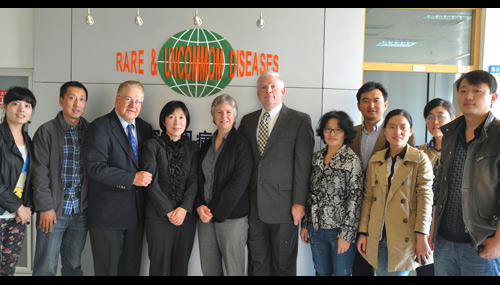Sharon F. Terry
Sharon Terry, president and CEO of the Genetic Alliance, reflects on her trip and what’s to come.
GEN’s China Dispatches are issued by Sharon F. Terry, president and CEO of the Genetic Alliance, a network of more than 10,000 organizations, including 1,200 disease-advocacy organizations, that enables individuals, families, and communities to reclaim their health and become full participants in translational research and services. A pioneer of consumer participation in genetics research, services, and policy, Sharon F. Terry serves a leadership role not only at the Genetic Alliance, but also at the Genetic Alliance Registry and Biobank and at PXE International, a research advocacy organization for the genetic condition pseudoxanthoma elasticum (PXE). After her visit to a hospital in Xi’an to attend a seminar on PXE, Terry begins to make plans for the future.
On the 14-hour flight home today, I had plenty of time to reflect on our six days in China. I see the tangible outcomes of our whirlwind tour of labs, hospitals, conference rooms, and clinics. I taste the cuisine from three distinct regions, sit in the presence of the tea culture, and stand in awe of the magnificent and misty Hua Mountain. I am touched by the wizened old faces that smiled wryly as we passed by, the exuberant (and sometimes very sick) children waving wildly, and still feel the clutch of teenagers asking, with the enthusiasm of paparazzi, if we would take a picture with them.
The next phases of collaboration are emerging. They are not so tenuous as they were last year. Our collaborators in the various cities understand now that we can be trusted and we can be relied upon. We returned a year after we began this exploration, as we said, and are keeping our part of the partnership alive and well.
My work overall is in disruptive advocacy, innovating to help individuals and communities reclaim their place in what I dearly hope will be a real system and not the dysfunctional mess we have today. My husband treads a similar path, and in his work with companies such as Genomic Health, InVitae, and MeMed, he enables systems that he hopes will alleviate suffering like we have witnessed this week.
As we summed up the week, we tick off the to-do items. Sharing all of the educational materials we have created for individuals and families affected by PXE is an easy step. We will establish a Chinese PXE International website and create materials that are useful to those affected and their clinicians, linking to their Weibo site (the Facebook equivalent in China). This will be important both to share information that will give the families support, and also to help build the registry and biobank that is emerging here. The Chinese researchers were excited by our work on the Platform for Engaging Everyone Responsibly (PEER). I demoed two versions of it for them, Registries for All (reg4all.org) and TrialsFinder (trialsfinder.org). They would like to offer this to their patients, but are rightly cautious. The needs of the Chinese people are different than those in the U.S. and Europe. Advocacy in the country is young, and is centered in clinicians, rather than activist lay people, like the U.S. Thus systems like PEER, in which one can set one’s own sharing, privacy, and data access preferences, are truly “foreign”. There are elements that are very appealing, however, and so we will work together to decide what a distinctly Chinese version looks like. It maybe that our older model (albeit novel because as lay people we founded it in 1995) Genetic Alliance Registry and BioBank might be a better fit. The young clinicians in the cities we visited are eager to try a variety of models. I am excited to see what emerges.
Another service we can offer is being sure that these researchers are aware of what is happening in the broader research community. Certainly they have access to professional society communications and meetings, but they have limited access to the more innovative science emerging in the advocacy and citizen science sectors. Again, China is in a unique position since the economy is growing solidly and steadily, and spending on biomedical research is increasing. They have resources for some of their work, and I suspect that will increase; and they need and want interchange with peers from other countries and cultures.
As with most productive trips, we return with more work to do. I look forward to crafting plans for both Genetic Alliance and PXE International in the next month, and am excited to connect our Chinese colleagues to advocacy organizations, other biobanks, and colleagues in other countries seeking collaboration. It is trite but true: the world is small, and as I remember the many beautiful faces of the last week, I am renewed in my commitment to take the necessary risks leading to better health for all.







